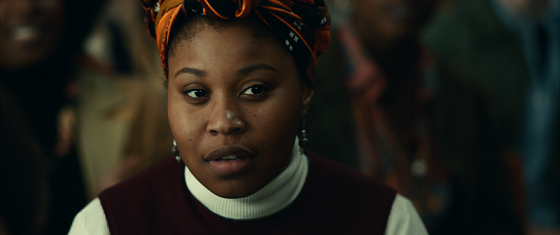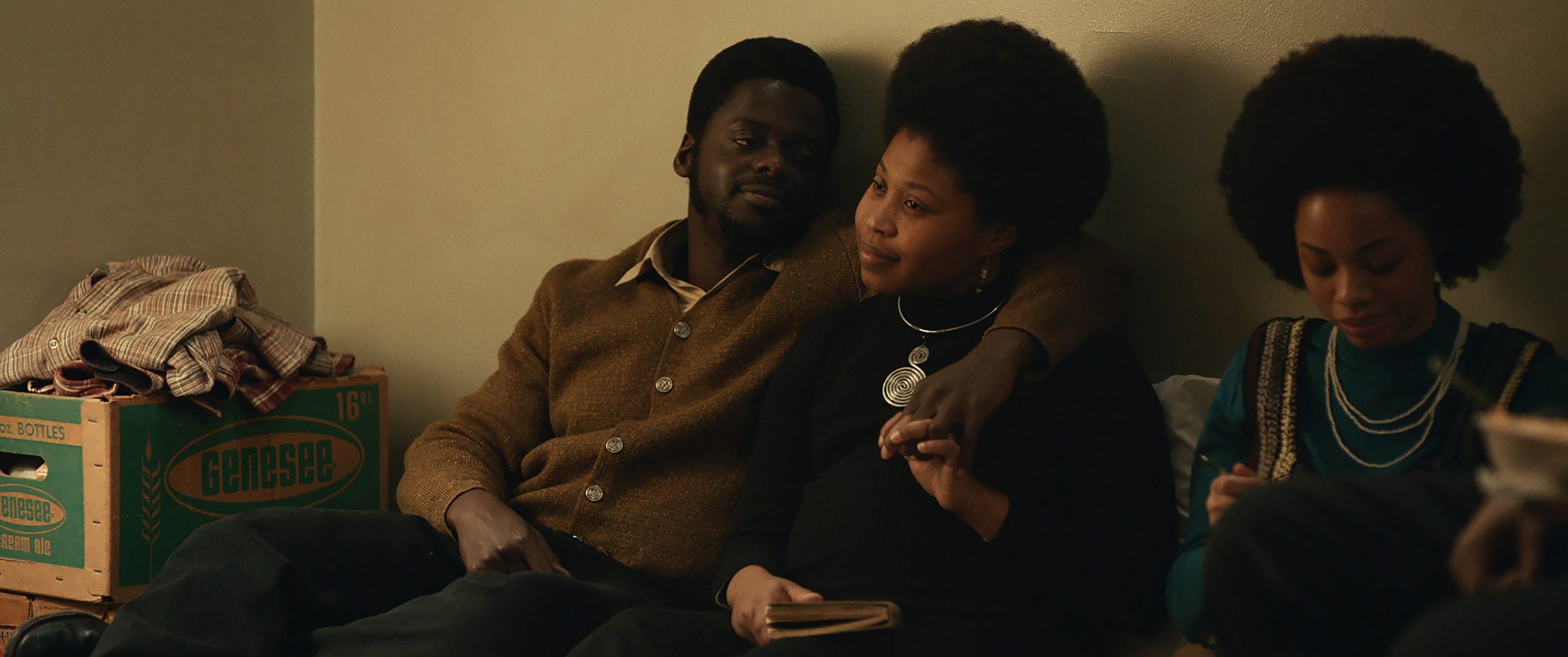
Dominique Fishback may have a supporting role in the upcoming biographical drama Judas and The Black Messiah, but your focus will remain on the actress throughout the film as if she’s the lead. As Akua Njeri (formerly known as Deborah Johnson), the fiancée of Chairman Fred Hampton, Fishback is soft, resolute, devoted, and enamored with the former leader of the Illinois Black Panther Party. It’s evident from her first appearance on screen why director Shaka King immediately wanted the actress for the part.
“I got an email saying that Shaka King was doing a story about Chairman Fred Hampton and Daniel Kaluuya and LaKeith Stanfield were already attached to it, Ryan Coogler and Charles King were producing, and he wanted me for Debra Johnson, and I had to reread it,” Fishback tells ESSENCE. “I was like, ‘Wait, does he want me or do I have to audition, what is he trying to say?’”
Even when Fishback met with King she couldn’t believe the role had so easily fallen into her lap. “I said, ‘Is this role mine mine?’ And he laughed,” she says, recalling the meeting. “He said ‘It’s yours. If you want it, it’s yours. So read the script and let me know your thoughts.’”
The Brooklyn native had plenty of those, but didn’t want to overstep when it came to King’s vision for the film. His response to Fishback’s concern, however, let her know just how collaborative a project Judas would be. “He said, ‘You’ll be playing her. You can’t overstep, give me your notes.’ When he called them notes I was like, ‘Oh shoot.’”
The chain of events may seem too good to be true, but there’s something to be said for alignment. At the time the thespian, who’s also a spoken word poet, met with Shaka she had been writing her own Romeo and Juliet version of the Black Panther Party. She’d also been reading “A Taste of Power” by Elaine Brown, a notable member of the Black Panther’s Oakland chapter. Even as far back as 2019, Fishback had begun listening to Malcolm X’s speeches every morning on Tidal, taking cues from the civil rights leader on how to speak for herself and correct people’s misconceptions without displaying frustration.

“I had the self-determination, as the Panthers would call it,” to understand and not let people put social constructs or their perceptions on me,” the 29-year-old says. “I had said that line in the movie and [Shaka] was like, ‘Perfect.’ And it was, really, because I didn’t know that Chairman Fred was listening to Malcolm every morning too and that connection in the scene allowed for Daniel and I to have that moment.”
Sharing intimate moments of Hampton and Johnson’s relationship within the context of their allegiance to the Black Panther movement and the larger narrative of the film was of utmost importance to Fishback. “They are falling in love for the first time,” she says, pointing out the Chairman was only 21 at the time he was killed and Johnson 19. “Even though they are revolutionaries, they love too. She’s giggling over him. You know what I’m saying? She’s in love, she wants to be around him. She wants to know him in that way.”
Showcasing that love, Fishback says, allows the audience to take away another important message from the film.
“A lot of times for Black women, we have to prove ourselves worthy of love. We have to stand by somebody. We get pregnant and only then are we worthy of commitment. I wanted to make sure that that was not the case. That no matter how many scenes we get with them, that we see that he loved her for her mind. And that he would have stayed with her regardless of if she was pregnant or not. It was not out of obligation or out of him being a man of honor that he stayed with her. It was because he loved her for everything she had to offer outside of being his comrade — just innately as a Black woman, worthy of love. That was important to me.”

One way that thread was kept alive throughout the story was through poetry which King allowed Fishback to use to put her personal stamp on the character. Though we don’t hear everything Johnson writes in the brown leather poetry book she keeps on her at all times, Fishback says she wrote poems for every relationship monument the couple shared, from first meeting to first kiss. Doing so helped her build a life for the characters, which she drew from when it came time to film the most difficult scene in the film: Chairman Fred’s murder.
In the scene, Fishback’s character covers Hampton’s body as the FBI sprays gunfire into his apartment, just as “mama Akua,” as Fishback calls her, did that early morning in 1969.
“She said, even if he wasn’t her man, she would’ve covered his body because that’s what it meant to be a comrade.”
Still, bringing that level of authenticity to the scene was hard. “The night before I couldn’t sleep; I had to cry. I had to mourn a loss because I pray to be a vessel for this love, for that sacrificial gesture that she does in the end that I can get there. It was very important that, no matter how many words she speaks, when you see her, and when you see her look at him, you know that there is love, there’s a deep love.”
Stepping into those shoes and experiencing that level of unconditional love, even for a brief while, transformed Fishback’s own views on love and how she wants to allow herself to be loved and “allow myself to trust, and fall, and feel safe,” she divulges.
“At the beginning of filming, I was like, how do I get there? How do I get there in love? I like to believe that I could do that for love. I don’t know. But to just get a little bit of taste, to even pretend for a little while that I could be that brave, I’ll take it. I’ll hold it with me forever.”